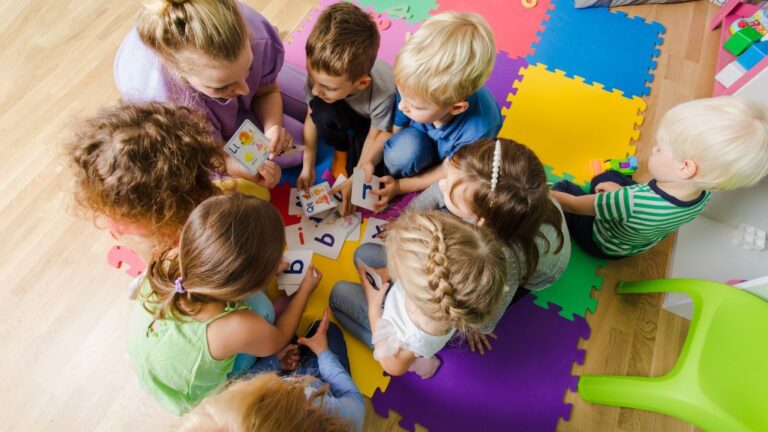Kindergarten is a significant opportunity for children to develop essential social, cognitive, and motor skills that set them up for a successful academic career and enriching life. School is vital for children as it prepares them to participate in future opportunities like employment or community events, so they can live fuller lives and gain autonomy.
Many parents recognize the value of kindergarten preparation for a smoother school year. Still, for parents of children with autism spectrum disorder (ASD), the kindergarten preparation process can feel quite daunting. As the parent of a child with ASD, the prospect of kindergarten can be nerve-wracking, particularly if their child is profoundly affected by autism or has limiting reactions to new environments.
Kindergarten preparation for a successful transition into academic life with a child on the spectrum involves much more than selecting a fun backpack, practicing letters, or getting ready to board the school bus. In most cases, kindergarten preparation for children with ASD requires comprehensive educational planning and skill acquisition to ensure kiddos feel capable and confident when they arrive on their first school day. For many families, ABA therapy is their solution.
Please read our blog by ABA Centers of Florida to discover how ABA therapy can help children prepare for kindergarten. We’ve also included some helpful tips to ensure the transition is seamless.
For more information about ABA Centers of Florida and how we serve neurodivergent families across the state, visit us here.
What Is ABA Therapy and How Does It Help Kids with Autism Prepare for Kindergarten?
ABA therapy, or Applied Behavior Analysis, is a highly specialized therapy that helps children with autism prepare for kindergarten by focusing on skills that lead to greater participation in life and reducing problem behaviors, which lends to classroom success.
Unlike traditional therapies or general tutoring, ABA therapy focuses on teaching various skills by breaking them down into smaller components and providing positive reinforcement for successful completion. Over time ABA interventions improve learning abilities and cognitive function while supporting other critical developmental areas.
By leveraging the power of ABA therapy, parents don’t have to transition to school alone. By providing positive reinforcement and having your child engage in ABA sessions tailored specifically to those on the spectrum, ABA therapy can be a robust tool for kindergarten preparation. Alongside ABA experts like Registered Behavior Technicians (RBTs) and Board Certified Behavior Analysts (BCBAs), parents can ensure their child is kindergarten ready and excited for this new chapter of life.
Through repetition and consistency, ABA therapy can help children with autism learn to communicate effectively, manage their emotions, and improve their interactions, all of which are crucial for a successful start to kindergarten and continually serve them in later life. By providing individualized attention and a tailored yet structured approach, ABA therapy can offer children with autism the tools they need to thrive in the classroom and beyond.
Benefits of ABA Therapy for Kindergarten Preparation
As parents, we want to see our children succeed in every aspect. Research shows that early ABA therapy can significantly improve a child’s readiness for kindergarten. Additionally, with skill-building techniques in place, children are better equipped to learn and share their knowledge, increasing their confidence and self-awareness. By focusing on personalized goals and addressing the client’s specific areas needing support, ABA providers can help children develop the necessary skills for academic success.
Here are some specific areas of kindergarten preparation that ABA therapy can support, including but never limited to:
- Participation in circle time
- Hand raising
- Waiting in line
- Following directions
- Recognizing their name
- Holding conversations
- Staying focused in the classroom setting
- Recalling a parent’s phone number in an emergency
5 Tips for Preparing Kids with Autism for Kindergarten
Starting kindergarten is a big step for any child, but it can be particularly overwhelming for kids with autism. Along with ABA therapy, there are other ways to prepare your child for kindergarten. Parents can spend time reading with them regularly, practicing hand-eye coordination, and encouraging independence when possible. Investing time and effort into preparing your child will make them feel more ready for school days.
Here are some tips to keep in mind as you work with your child on kindergarten preparation:
- Establish a routine and do your best to follow it.
- Utilize visual schedules or aids.
- Practice socialization skills whenever possible.
- Ensure your child is comfortable with standard school procedures to limit surprises.
- Find ways to incorporate structured learning into daily life.
With patience, dedication, and the right ABA resources, you can help your child start kindergarten feeling more enthusiastic about the new undertaking.
Positive Reinforcement Strategies to Encourage Kindergarten Preparation
Whether your little one is starting school for the first time or simply transitioning to a new environment, positive reinforcement strategies can make all the difference when it comes to encouraging and motivating your child. Positive reinforcement can be constructive during this time of change.
From offering verbal praise to rewarding good behavior with stickers or small trinkets, there are plenty of creative ways to foster a sense of gratification in your child as they embark on this vital stage. By exploring different positive reinforcement strategies and finding the ones that work best for your child, you can help ease the transition to kindergarten and set them on a path toward longer-term success adapting to change.
Special Considerations for Kids with Autism Going to Kindergarten
Preparing kids with autism for kindergarten can be challenging for parents and caregivers. Still, it can be an easier transition by keeping special considerations in mind. Sensory sensitivities and potential meltdowns can be overwhelming for children with autism having new experiences with unfamiliar people. Understanding these triggers and proactively implementing strategies can simplify the transition.
Ask your ABA provider how you can support your child through kindergarten and ways to ensure the school understands their needs and triggers. Teachers and caregivers should do everything possible to create a safe and accepting space for children with autism to learn and grow. When considering each child’s unique needs, kindergarten can be a positive and successful experience for children with autism.
ABA Therapy Can Help Your Child Be Kindergarten Ready!
ABA therapy supports children with autism to reach their highest potential in many ways. ABA interventions have many advantages over traditional teaching methods. The principles of ABA can make the transition into kindergarten smoother for many children by focusing on features of life that help them learn best.
From maintaining a consistent routine to incorporating positive reinforcement strategies, parents can play an integral role in helping their child transition into kindergarten. Parents and schools should also consider special features of autism, like sensory sensitivities, as children transition to school. Finally, picking the right ABA agency and providers that truly understand your child’s needs is essential.
More About ABA Centers of Florida!
At ABA Centers of Florida, we have the most experienced team of ABA specialists ready to help your child prepare for kindergarten and provide guidance during this hugely significant period of their life. ABA therapy offers a powerful option to better prepare your child with autism for kindergarten or any other educational experience leading to better outcomes.
With ABA’s strong track record and use of evidence-based practices, this therapy changes how students with autism progress through school and later life. So if you want the tools necessary to put your child with autism on the path toward tremendous success in life and academics, don’t hesitate to call us at (772) 773-1975 or contact us here to learn more about your options for diagnostic services and ABA therapy with us today!








